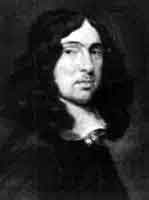Biography of Andrew Marvell

Andrew Marvell was born on March 31, 1621 at Winestead-in-Holderness in Yorkshire, England. As the son of Reverend Andrew Marvell and his wife Anne, Andrew and his family moved to Hull, where Reverend Marvell became lecturer at Holy Trinity Church when he was just three years old.
Marvell was educated at Hull Grammar School until he matriculated as a Sizar for Trinity College in 1633. Just four years later, two poems by Marvell, one Greek and one Latin, were published in the Musa Cantabrigiensis. One year later, Marvell was admitted as a Scholar of Trinity College and took his B.A. the same year. Only a few days after receiving his scholarship, Marvell's mother passed away. He stayed a few more years at his current residence and left Cambridge after his father's death, by drowning, in 1640.
It is not entirely known what happened in the years following, however it is believed that Marvell spent two years as a clerk for his brother-in-law Edmund Popple's tradinghouse.
Between 1642 and 1646, Andrew traveled extensively abroad; including France, Holland, Switzerland, Spain and Italy. In 1650, Marvell began tutoring Mary Fairfax, a twelve-year-old girl who later became Duchess of Buckingham, daughter of Sir Thomas Fairfax, a retired Lord General of parliamentary forces.
While at the Yorkshire seat in the Fairfax family, Nun Appleton House, Marvell wrote his most non-satiric English poems. The stay provided Marvell with material for his most profound poem, Upon Appleton House, a poem which defines him as both a man and a poet. The stay also provided such poems as To his Coy Mistress and The Definition of Love.
In 1653, Marvell met and befriended fellow poet John Milton. Milton later wrote a marvelous recommendation for the post of Assistant Latin Secretary to the Council of State for Andrew for Marvell, which he soon occupied in 1657.
As a great supporter of the King under Commonwealth, Marvell became an adherent of Cromwell and began tutoring his nephew and ward, William Dutton of Eton, in the summer of 1657.
When September came, Marvell was appointed assistant to John Milton, Latin Secretary for the Commonwealth and was paid a salary of £200, the same as Milton, only not a life pension.
In 1659, Marvell was elected to parliament from his hometown, Hull, and continued to hold the post until his death.
During the last twenty years of his life, Marvell came even more politically active, taking part in diplomacy with Holland and Russia and writing political pamphlets and satires. His political maneuvering was most skillful, convincing Charles II to not behead Milton for his anti-monarchical writings and revolutionary activities and punishment for his own cooperation with republicanism.
On August 16, 1678, Andrew Marvell died of tertian ague (and malpractice). He was then buried in the church of St. Giles-in-the-fields.
Poems by Andrew Marvell
- An Horation Ode. A celebration of Cromwell's victory against the Irish.
- Bermudas. A poem of thanksgiving.
- The Definition of Love. Marvell tries to apply logic to love.
- To His Coy Mistress. He tries to convince his unrequited love to love him.
- The Garden. A look at Marvell's spirituality.
- Upon Appleton House. A country house poem as he also speaks of politics and religion.
